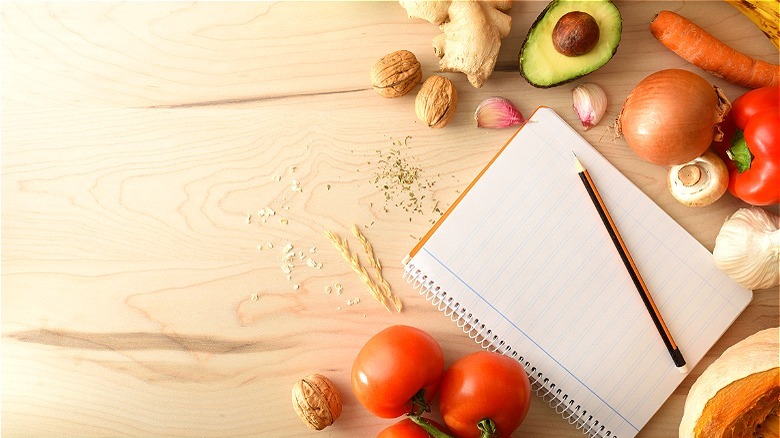Avoiding Elaborate Recipes Has Saved My Wallet And My Peace Of Mind
Cooking in my kitchen at home is always an adventure. Since I'm someone who, without question, lives to eat, the extensive range of smells, textures, and flavors has never ceased to excite my tastebuds. I also enjoy stretching my creative side from a culinary standpoint, while simultaneously trying to avoid spending my entire paycheck on one weekly grocery trip. That being said, I can't flex my creative muscles if I'm constantly following step after step of the latest featured recipe from the New York Times Cooking website.
I'm not trying to argue that sitting down to a flavorful, multi-step dinner isn't enjoyable. But it's hard to ignore the fact that elaborate recipes aren't cheap. And even when I do fall into the trap of making one special meal after the next, I find myself with more restrictions by the week's end at a time when I actually need to start showcasing my resourcefulness. Those leftover portions of specific ingredients I felt such conviction for last Sunday may very well end up in my compost bin if I don't feel confident incorporating them into future dishes.
The heart of the matter is that following extensive recipes can be costly. By paring down my visions of summer salads dressed in a multitude of fresh herbs and Grand Marnier-infused desserts, home cooking has become more cost-effective. And, as surprising as it may sound, it's also become exceedingly more pleasurable (or at least a lot less stress-inducing).
Is following a recipe exactly worth the price?
It's true that eating at home and cooking freshly prepared meals has been proven to be associated with higher-quality nutrition in consumers' everyday diets (well, according to at least one 2014 study, at least). However, making homemade meals every day isn't exactly cost-effective. And in my experience, specific recipes become irrevocably pricey when it comes to distinct ingredients I can't easily integrate into my regular meal rotation.
Let's say for dinner one night, I plan to follow a seasonal recipe that calls for four different types of green herbs. Instead of buying fresh parsley, thyme, basil, and dill, which all tend to have the same fast-approaching expiration date, I'll substitute dried herbs for the majority and purchase only one fresh varietal — the one I feel confident reusing for future dishes. Avoiding the purchase of high-cost, one-use foods has definitely saved me from overspending, but sidestepping those rarer ingredients has also decreased the amount of food I throw away.
Still, I need to be mindful of what ingredients I choose to leave behind. For instance, I can't avoid buying prepared horseradish in my attempt to make horseradish salmon. Instead, I try to lean toward recipes where more customary ingredients are recommended. By staying within the confines of my own comfort level, I feel able to repurpose the ingredients I chose to buy. With that being said, how am I able to save money, throw away less food, yet still create delicious meals each and every week?
Meal plan from a generalized point of view
Since I want to save money and reduce my household food waste, I usually designate those special multi-ingredient meals to just one night per week. For me, the best way to start meal planning is by taking stock of the foods I already have available, and buying proteins, fruits, and vegetables I feel most comfortable using. (After all, you don't have to be a high-skilled culinary wizard to make a few recipes with 5 ingredients or less.)
Another big factor in keeping things within my budget? Reusability. Leftovers from whole chicken roasted in the oven can be used for chicken Caesar salad one night and chicken tacos later in the week. If I want to make a salad with special herbs like a dill vinaigrette, I'll make sure to find another basic recipe I can incorporate that leftover fresh dill, such as Greek-inspired meatballs. By finding many uses for a handful of main ingredients, I end up saving money and wasting less food. I can also create my own signature dishes when I have a general stock of traditional items on hand.
Delicious, noteworthy meals don't always require fancy ingredients. By sticking with my favorite proteins, grains, and produce, I'm able to save money, waste less, and make many tasty meals without overthinking. It might be good for my appetite and my wallet, but it's even better for my peace of mind.


